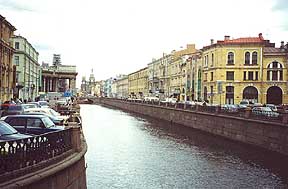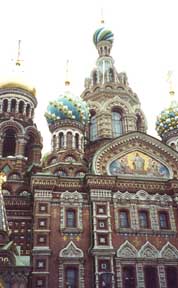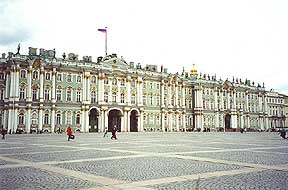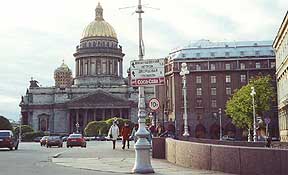Streets of St. Petersburg
ST. PETERSBURG
MAY 28
Predictably, the train from Moscow pulled in at 'Moscow Station.' The St. Petersburg International Youth Hostel was just a ten-minute walk away.
It was too early to check in, so I stored my bag and took the metro to buy a bus ticket to Estonia. The metro was crowded -- it was rush hour -- so I walked back to the hostel, sightseeing the main drag -- Nevsky Prospekt -- as I went.
I imagined my Russian sailor friends' lives in St. Petersburg. The were all still on board the "Direct Kiwi," but called St. Petersburg home. Surely they too walked Nevsky Prospekt, on Saturday nights and Sunday afternoons. I realized I'd probably never see any of them again, and it made me sad.
I passed a familiar sandwich shop, and stopped in for lunch. "Minutkya" was "Subway," but it wasn't "Subway." I'd read about it in the "Moscow Times."
Originally, it had been an American-Russian joint venture. According to the newspaper, the Russian partners had been thugs who had ousted the American partners, kept the menu and decor, but changed the name.
 canals cut through St. Petersburg
canals cut through St. Petersburg
And so I sat under Williamsburg Bridge wallpaper and ate a six-inch tuna on white, served on a brown tray on a yellow table. I wondered if the Russian version of "Minutkya" events was different.
Back at the hostel, I moved my bag into a sunny room with five beds. My ankle was still sore, although my shoe had gone back to its original shape and quit rubbing. The sun hadn't warmed up Russia enough for me to go outside in sandals, so I switched to Tevas with socks. I found this look quite appalling, but Yancey had talked me into it via e-mail. "Who are you trying to impress?" he'd asked.
My craving for vegetables, which had begun somewhere in Siberia, had not subsided. I went to "Cafe Idiot," an expensive vegetarian restaurant recommended in my guidebook. I proceeded to become an idiot myself. The freshly-ground coffee smelled great, so I ordered a cup. It showed up thick and black, accompanied by a small cup of cold water.
"It's like Turkish coffee" I thought, adding the water to the coffee. Eagerly, I brought it to my lips, inhaling the aroma with anticipation. This beat the hell out of all that instant Nescafe I'd endured since Beijing.
Waitaminute. This wasn't plain coffee. This tasted like... alcohol.
"Excuse me," I stopped the waitress. "What did I just put in my coffee?" I waved the now-empty cup that had held "cold water."
"Vodka," she said flatly, and went about her business.
Of course. I was in Russia, where men strolled casually down the street while drinking beer or vodka. I was an idiot with an expensive lesson sitting in front of her, followed in rapid succession by another expensive lesson. My "main dish" showed up -- it was two tiny potato croquettes and a barely visible salad. I ate it in twenty seconds and walked back to the metro, unusually worn out and depressed. If I were a four-year-old, my mommy would've
put me down for a nap. If I were anywhere near Michael, the kindergarten teacher I'd met in China, he would've known instantly what to do with me, in spite of my having thirty years on his usual charges.
Fourteen days and four countries were in between me and my self-designated Berlin rest stop. I knew I'd make it, but in what kind of shape? I was numb, and barely cared what I was looking at anymore. And worse, I was making a lot of mistakes.
I stopped in Cafe Chaskha near the hostel, anxious for a snack. It turned out to be a sort-of Russian version of "Starbucks," which was surprising, but the real shock came when I realized I could read the Cyrillic menu. Admittedly, it was a short menu containing simple words like "cappuccino" and "espresso," but I was pleased.
I was also pleased that Russians kept asking me for directions. I fit
in well in St. Petersburg, and attributed it not to my Tevas-with-socks
(although I had seen many Russian sailors dressed that way), but to my
bike messenger bag and hair's brown roots. If you don't want to look like a
tourist, let your hair be unruly and don't carry a knapsack. Carry a bike
messenger bag, like you would at home. Kids in Ulaan Bataar, Hong Kong, and Hanoi carried bike messenger bags, a trend that I am almost certain originated on the streets of New York. As for the roots, this was something that seemed popular around the world as well. I had been out of the US for some time, but when I'd left, half the women in the East Village showed a good inch and a half of roots. I had too. Was it in vogue, or like me, just tough to get an appointment with the hairdresser?
Back at the hostel, I struggled with the showers. Hot water showers were only available on the first floor, for four hours in the morning and four hours at night. I didn't want to fight the crowds in the morning, so I put on my baggy "hostel-nightwear," took my toiletry bag and microfiber quick-dry towel, and headed for Floor One.
The men's showers were on the right, the women's on the left. The men's had a sign that said, "no hot water in men's, please use women's."
I can personally attest that there was no hot water in the women's either. Not something you want to experience in cold weather in St. Petersburg. I came out clean but freezing, and went to the front desk.
"Excuse me," I said, "is the water ever warm?"
"Yes," said the receptionist. "It is warm in June and July."
"Are you telling me that for ten months a year, the water is cold?"
She laughed and shrugged.
"For twenty dollars a night, I expect hot water." I said.
 cathedral
cathedral
Another shrug.
I went upstairs, where two French girls in my dorm told me that the water had been hot a few days ago. Perhaps there was just something wrong tonight. They were also surprised to see me using my own sheet.
"They should have given you a sheet when you checked in."
I wasn't doing too well at the St. Petersburg Hostel.
MAY 29
A group of Finnish teenagers on holiday woke us all up. They were
howling in the corridors, out of control in that special way that only
teenagers on a group holiday can get.
I dragged myself into the breakfast room, where a know-it-all from
Berkeley tried to latch on to me.
"We could go to the Hermitage together. Have you noticed how awful the driving is here? I hated Moscow, everyone was so rude. I am an expert on Russian culture. The country Russians are so unsophisticated. Blahblahblah..."
I told her I hadn't noticed how rude everyone was, thought the driving was fine, knew plenty of Americans whose idea of class was the Franklin Mint, and was busy today. I fled to the safety of Cafe Chaskha, where REM played on the stereo, the coffee was not bitter, and all was right with the world.
I was there to plan my assault on the Hermitage. Instead, my mind wandered, and I reached a startling conclusion.
My life in New York sucked.
Sure, I had stumbled onto a great two-bedroom apartment in the most-happening neighborhood in Manhattan. I'd had a job playing with the X-Men every
day, the kind of job that little boys daydreamed about during math class.
Sometimes they had even lined up for my autograph. I was my own boss and worked
at home. Unless I felt like working in the office for a few months. I had
everything anyone could have wanted, and had two months off every year to run
around the world.
Sounds great, right? Especially the two months off bit. Now imagine that the ten months "on," are filled with working, night and day. Comic books come out every month and are eternally behind schedule. The price I paid for two months of play, was ten months of constant work. Friends fell by the wayside, relationships were out of the question, and going to the movies was something I had to plan in advance. My only human contact was with the mailman, and we'd have the same conversation every day.
I used to think I could never live anywhere but New York. But now, sitting in Cafe Chaskha in St. Petersburg, I knew that I could live anywhere -- even in Russia -- that had weirdos and good restaurants. As long as I could have a life instead of just a job, I would go anywhere. And I've have to go somewhere, because the one thing worse than staying in a miserable situation, was being a nomad forever, with nowhere to call home.
The Hermitage let me in free on my student I.D. card, and was far more interesting than I remembered it being. I had gone there on a field trip when I was 17, while living in Finland as an exchange student. Plenty of 17-year-olds surrounded me now, giggling and trying to impress each other with their nonchalance. I squeezed past and looked at the paintings.
"Hidden Secrets Revealed" were classic paintings that had been "acquired" during World War II. "Don't these paintings belong to somebody?" I thought, remembering the current movement to return art to the families of those from whom it was stolen.
 Winter Palace at the Hermitage
Winter Palace at the Hermitage
But then, in a way, the Russians had earned the paintings with their lives and suffering. 40 million Russians died fighting the Nazis, and half a million of those were Leningrad citizens who had starved to death under siege. Bodies had been piled in frozen sidestreets, the "temporary morgues," and the only supplies had come across frozen Lake Ladoga, in the dead of winter.
Later, I read the "History" chapter of my guidebook, trying to reconcile the pleasant, innocuous Russia I was seeing with the "Evil Empire" of my Reagan-era youth.
Basically (and this is a great oversimplification), Russian history is filled with coups, civil unrest, governments dismissing governments, and a lot of manic, insane leaders. In the U.S., if we have a bad leader, he will be voted out or at worst, only be in office for eight years. Certainly, a lot of damage can be done in that time, but nothing on the scale of what the Russian people have faced.
Stalin was one of history's most unbalanced, ruthless leaders. His
colossal blunder of trusting Hitler in 1939 led to the deaths of
millions of Russians. Later, he became paranoid and after sending millions to the Gulag, he started in on his allies. He purged innocent, guilty, friends, and enemies. Minor infringements could be punished with exile to Siberia, followed by death. The West was complicit in Stalin's takeover of Eastern Europe, allowing Stalin great negotiating power after Russia's stunning human losses and military victories in World War II.
Lenin and the Bolsheviks themselves had not come to power through popular support or through the will of the people. They had only gotten 25% of the vote in 1917, but in the chaos and civil war that followed, the Communists had come out on top.
 street signs have corporate sponsors
street signs have corporate sponsors
Somehow, Russia, in spite of being the world's largest physical nation, has just never gotten it together politically. And as everyone knows, the recent history has been just as chaotic. Aid poured in, only to be stolen by a new mafia. But things were changing for the better in Russia, and while as a tourist, I didn't see much, it did look like the quality of life was stable, and the possibilities were looking up.
ST. PETERSBURG TO ESTONIA
MAY 30
There was still no hot water. Everyone was complaining.
Back in my dorm, I complained too. What was with this hostel?
"That's why we won the Cold War," said a tourist from Illinois,
lowering her voice.
"Oh, really?" I thought. "I was under the impression that 1)I didn't personally have anything to do with the Cold War and 2)the Soviet Union lost the Cold War under the crushing economic weight of its own impossible infrastructure and military expenditures. I didn't realize it was from bad hotel service."
Instead of saying this aloud, however, I left. I'd had enough. I wanted a decent shower, and a good meal with vegetables. Europe was a short bus ride away, and I had a reserved seat.
A few hours later, we were at the border. The Russians inexplicably x-ray bags at the border. Were they afraid I was smuggling out one too many matryoshka dolls? There was nothing to smuggle out, only stuff to smuggle in. The bus made a long stop at Duty Free, and everyone stocked up on alcohol and cigarettes, and then pulled into the green of Estonia.
NEXT: quaint, medieval Tallinn! A night in a converted donkey's stable! A day pass to consumer-culture, Marimekko, Stockmann's, and Swedish meatballs in Helsinki!